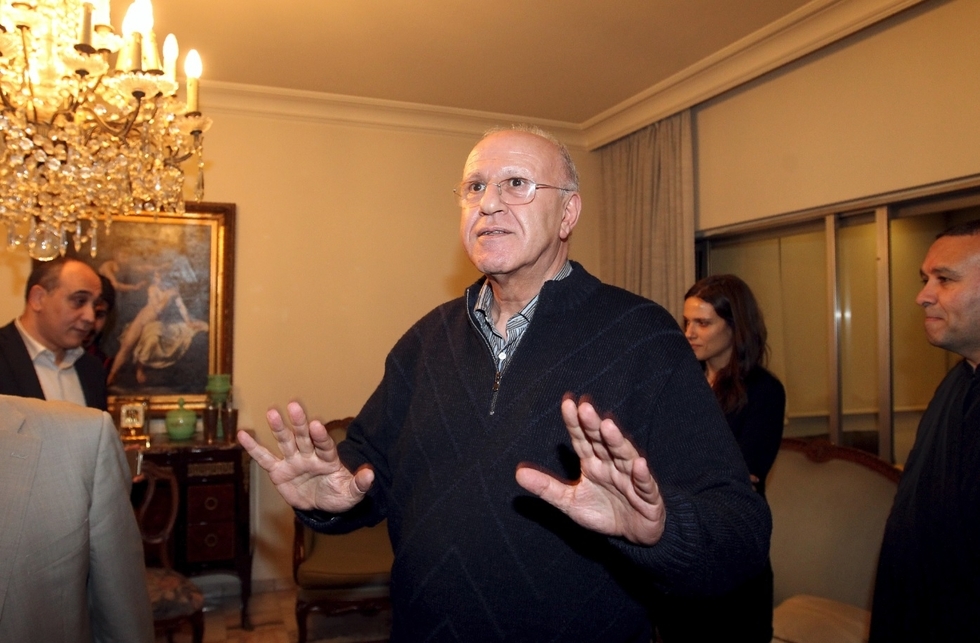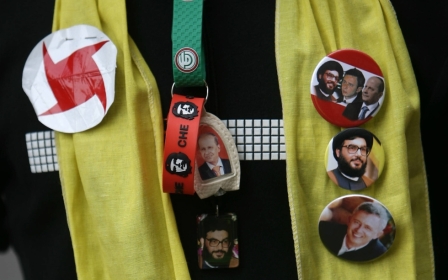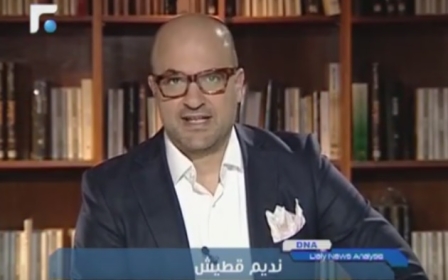Michel Samaha and Syria's continued efforts to undermine Lebanese security

"Lebanon is a prisoner of its own geography" despaired the veteran Middle East journalist David Hirst. He was of course reflecting on the small Levantine republic's long history as the coveted object of foreign powers looking to improve their geo-strategic lot.
To the dismay of the Lebanese, the only thing that exceeds their country's experience with war is its experience with venal politicians having long surrendered their morals to the seductive power of the foreign pay cheque. Fierce sectarianism and an appetite for slush funds come standardised with the geriatric ward of Lebanese politics, and unfortunately, this grim propensity persists.
In early 2012, the country's ex-information minister Michel Samaha was indicted on charges of smuggling explosives from Syria into Lebanon with the intention of assassinating political opposition and religious figures. The attacks would have killed civilians too, as – according to Samaha – "collateral damage is allowed".
Samaha's instantaneous confession swiftly earned him four-and-a-half-years in the slammer. A Lebanese security source told me that "Samaha was plotting the bombings in order to stir a Sunni-Christian conflict."
So iniquitous was Samaha's plot, not only because it intended to murder and maim, but more so because its objective was to exacerbate sectarianism in a country still communally divided by the scars of its 15-years civil war.
Syrian plot to reignite sectarianism in Lebanon
The more discerning among readers will know that an attack on one sect in Lebanon is enough to open a Pandora's Box of reprisals that usually take the form of indiscriminate explosions in Beirut's crowded suburbs. If Samaha got his way, any scintilla of a chance of reconciliation between Lebanon's Sunni, Shia, Christian and Druze communities would likely have been vanquished. However, it later became evident that this is exactly the kind of chaos that Samaha and his paymasters had wanted to foment.
In a video leaked last year, while gorging on a platter of fresh fruit, Samaha oh-so-casually lists off the names of the unsuspecting victims he intended to have pulverised - most of them religious and political leaders. The minister had transported roughly 20 explosive devices in the boot of his car from the Damascus, including magnet bombs which could be attached to cars.
It emerged that Samaha's macabre conspiracy to organise explosions in multiple locations around Lebanon was at the behest of his masters in Damascus. Not content with the ongoing bloodbath in their own country, the Syrian regime fancied a similar fate for Lebanon. The bombs given to Samaha were allegedly supplied by Syrian security chief, Ali Mamlouk. The implication of Mamlouk - a key figure in the Assad regime's intelligence network - places him, and by extension, the Assad regime, at the heart of yet another attempt to sow sectarian chaos in Lebanon.
Lebanese trial
The Lebanese authorities have indicted Mamlouk in the case, and the tribunal ordered a separate trial for him to be held. Naturally the Lebanese know that their decision will fall on deaf ears, as the chance of Damascus handing Mamlouk over to stand trial for contriving acts of terrorism against the Lebanese people are nonexistent. The leak indicated that Assad was personally aware of the bombing plot, but the Lebanese authorities did not specifically mention the Syrian president.
For those who know both Samaha, and the intertwined history of Lebanon and Syria, the aforementioned revelations aren't so shocking. The indicted has a long history of close connections with the Assad regime, and he once served as an advisor to the dictator Bashar al-Assad himself. The former minister has also been placed under the paternalistic eye of the US since 2007 when he was sanctioned along with a number of other pro-Syrian Lebanese politicians for "contributing to political and economic instability in Lebanon".
The role of Samaha as surreptitious Syrian agent may seem gratuitous unless one understands the historical context of the Assad regime's unrelenting and concerted efforts to intercept Lebanon's politics.
Syria has always fancied itself as Lebanon's patron, and its political and ideological goal since the mid-1970s has been to absorb Lebanon and cancel out its autonomy. In 1976 - during the crazed days of Lebanon's civil war - Syria began its occupation of Lebanon. The occupation ended in the year 2005 when the Lebanese people finally pushed up against the sole of the Syrian jackboot that had trod on them for the previous three decades.
Assad's allies and foes in Lebanon
The actualisation of Samaha's sordid plan would only have been the latest in a grim litany of ostensible Syrian-commanded and financed assassinations of high-profile figures in Lebanon. In February 2005, the popular and anti-Syrian politician Rafik al-Hariri was killed by a massive car bomb outside the St Georges Hotel in downtown Beirut, sending shockwaves and indignation through Lebanese society.
An often underreported case in the foreign press is that of Gebran Tueni, the former editor in chief of Lebanon's centre-left An-Nahar newspaper. Venerated for his brave criticism of the Syrian occupation, he too was silenced in 2005 for having the bad taste to challenge his country's occupiers. This of course, does not even take into account the other dissidents and politicians that were either assassinated or captured and taken deep into Syria's dungeons during the occupation.
"Assad left in 2005, but his intelligence networks still operate here," May Shaheed, a political science student at the American University of Beirut, told me. "Although we feel for the ordinary Syrian people suffering now, and we don't blame them, we still remember the suffering caused to us by Assad's occupation" she added.
The latest revelations regarding Samha serve as a reminder to Lebanese people that their country is still, for now, caught in the gravitational pull of Assad's Syria, and that Assad, despite being bogged down in his own civil war, still has an interest in keeping Lebanon's political conditions just right. Making sure his Lebanese cheerleaders stay in government, while keeping opposition that may facilitate genuine political reconciliation between sects at bay, is the name of the game.
Samaha's release
No whit abashed, the Lebanese military court released Samaha in January on bail and said that he'd served "most of his time" in prison. Naturally, a paroxysm of anger followed, with thousands of citizens taking to the streets in protest. The leader of the Lebanese Progressive Socialist Party, Walid Jumblatt - whose father was murdered by Bashar's father, Hafez al-Assad - deplored the release as "legalising crime". Others joined in the chorus of condemnation, with the Minister of Justice Ashram Rifi lamenting that the "military court is dead" and resigned in an apparent protest against alleged meddling in the country's justice system by Hezbollah, which is allied to the Assad regime.
Perhaps the biggest travesty is that the Lebanese military court, ostensibly in place to protect the ordinary people from terrorism and other such threats, squandered bringing Samaha to real justice. The final military court of appeal is due to take place in April, when both the prosecution and defence will deliver their closing statements.
It is very likely that Samaha will be allowed to return to politics, in fact he has already brazenly boasted that "I'm still part of the political scene."
For ordinary Lebanese, escaping the orbit of Assad's Syria would be a definitive prerequisite to a more independent and representative Lebanese political scene. Thus Lebanon's trajectory is tied to the fate of Assad. What comes after him may be better or worse, but one thing is for certain: as it always has, the geo-strategic value of Lebanon will likely continue to invite the intrusive gaze of its bigger neighbour.
- Matthew Ayton is a reporter, politics and history lecturer based in Beirut. He has previously reported from the occupied Palestinian territories.
The views expressed in this article belong to the author and do not necessarily reflect the editorial policy of Middle East Eye.
Photo: Former Lebanese minister Michel Samaha (C) gestures upon his arrival at his home in the residential neighbourhood of Ashrafieh in Beirut, on 14 January, 2016, after a military tribunal ordered his release on bail (AFP).
New MEE newsletter: Jerusalem Dispatch
Sign up to get the latest insights and analysis on Israel-Palestine, alongside Turkey Unpacked and other MEE newsletters
Middle East Eye delivers independent and unrivalled coverage and analysis of the Middle East, North Africa and beyond. To learn more about republishing this content and the associated fees, please fill out this form. More about MEE can be found here.





